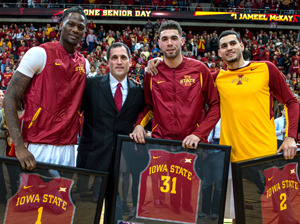Marston project headed for June completion
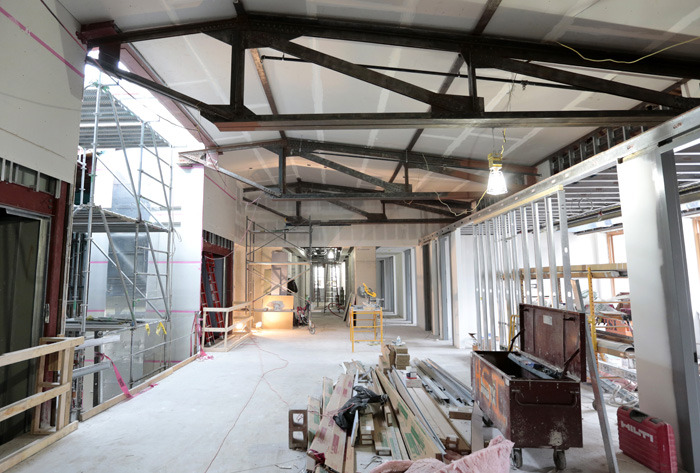
Four of the original roof trusses will remain exposed in the new design for Marston Hall's fourth floor. Photos by Christopher Gannon.
Since mid-January, 70 to 80 workers per day have been hard at it in Marston Hall, including air handling and electrical teams, drywall specialists and even some painters on the top two floors. A fourth-floor skylight and two elevators are in, and a team has begun to erect new steel stairs in the existing west-side stairwells.
Construction work and systems testing on the $27.1 million renovation of Marston are scheduled for completion by early June. Following that will come six weeks of furniture installation, with the first tenants – Engineering student services – set to return in mid-July. All others will follow over the next two weeks. Fall classes will be scheduled in three state-of-the-art classrooms, each with seats for 80 students.
An interior you might not recognize
During demolition, which began in December 2014 and continued for about a year, 75 percent of Marston's interior walls and floors were removed. Crews hauled out 2,993 tons of material, about 97 percent of which – concrete, metal, bricks -- was recycled or reused. A system of steel beams and brick load-bearing walls was replaced with an all-steel network that created larger spaces at the north and south ends of Marston.
One area will remain largely untouched. The building's east entrance and winding staircases to second floor will look much as they have for the last 112 years.
The renovation is in various stages of completion, depending on which floor you visit. Project manager Kerry Dixon, facilities planning and management, estimates that the fourth floor is 85 percent completed, while the first floor is about 40 percent done. Why the distinction?
"It's easier to close off the upper floors and keep them clean once the work is done," she said.
Marston Hall first opened in 1903. In addition to the classrooms, the renovation will create student services, and visitor and student interaction spaces on the first two floors. Engineering career services and more student project rooms will be on third floor. The college's development, communications and dean's office staffs will move to the fourth floor. The three floors of the west rotunda will become a student lounge/welcome center, 177-seat auditorium and conference room/special event space. The project is being paid for by university and college funds (about two-thirds) and private gifts (about one-third).
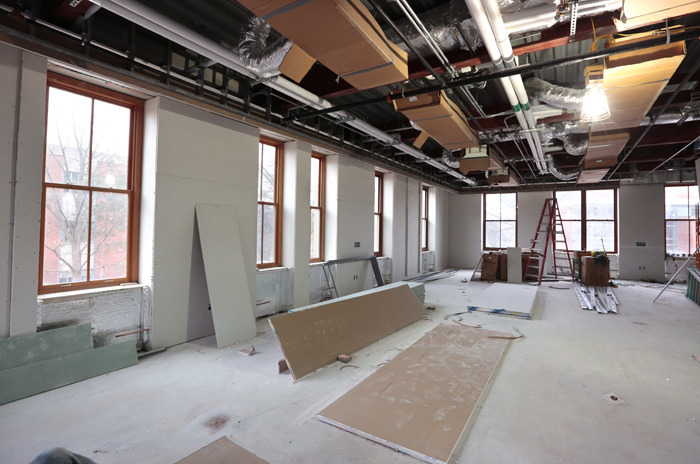
This general university classroom, taking up the whole south end of the second floor, mirrors one at the north end. Engineering-LAS Online Learning will have its own classroom on the third floor.
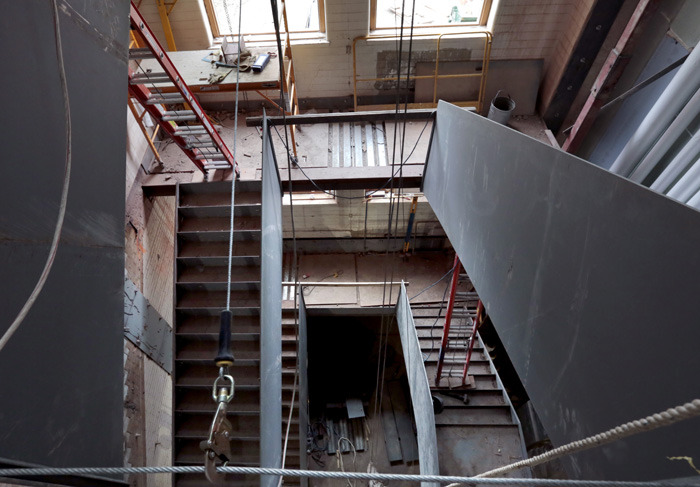
The southwest (pictured) and northwest staircases are being rebuilt to current building code.
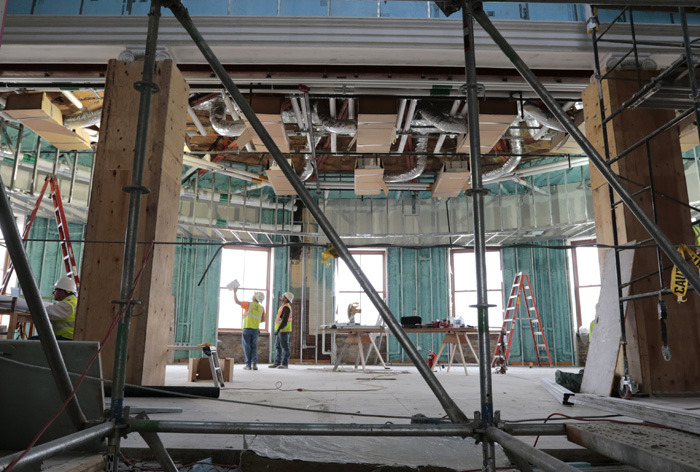
The top (third) floor in the west rotunda will become a conference/special event space. Protected behind the two plywood structures are marble columns original to the building.
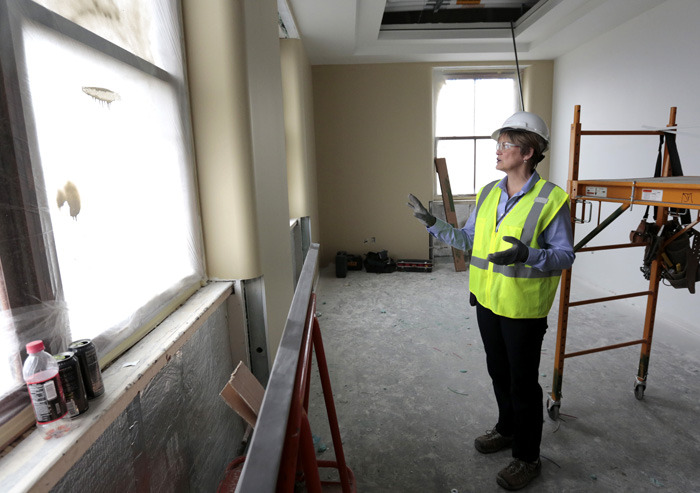
Project manager Kerry Dixon is pictured in a partially painted fourth-floor office.
Related stories:
Marston Muses are getting a makeover, Aug. 6, 2015
A peek inside Marston Hall, May 21, 2015
Demo work in Marston turns up a few treasures, Jan. 22, 2015
Interior demolition at Marston begins next month, Nov. 6, 2014
Marston tenants are starting to move, June 5, 2014
Regents hear about recruitment consortium, Des Moines education needs study
By late summer, faculty and staff recruitment efforts could get a big boost. Iowa State is poised to become part of a statewide chapter in a national recruiting consortium. Planners provided an update to the state Board of Regents during the board's Feb. 25 meeting on campus.
Since July 2015, a planning group with representatives from the three regent universities has been investigating an all-Iowa chapter in the national Higher Education Recruitment Consortium (HERC), a nonprofit group of 700+ universities, colleges, research labs, hospitals and government agencies that collectively generates a large jobs database. Its mission is to help members recruit and retain a talented, diverse employee group, with a special emphasis on recruiting dual-career couples.
The national consortium currently contains 17 regional affiliates focused in the northeast and the west coast; Iowa would be the 18th.
The next step in creating an all-Iowa chapter is an informational/networking event on Tuesday, March 29 (10 a.m.-2 p.m., Des Moines Area Community College, Ankeny). Scheduled for May, the inaugural meeting of the Greater Iowa regional HERC advisory board will include representatives from all institutions interested in joining. That group will set an annual fee structure, based on fulltime-equivalent employee numbers, estimated to range from $500 to $7,000. As proposed, the regional HERC membership would be activated on July 1.
Iowa State's early planners include Dawn Bratsch-Prince and Chelsey Aisenbrey from the provost's office; and Katie Clark, Kristi Darr, Brooke Dykstra and Julie Nuter from university human resources.
Des Moines higher education needs assessment
Late last semester, the board hired MGT of America, Tallahassee, Florida, for $91,000 to complete a higher education needs assessment of the Des Moines metro area, including gaps in what's offered and where. The study also is to include a review of potential locations (metro areas, not specific properties) for delivering courses or programs. This was prompted by AIB College of Business' decision about a year ago to gift its campus to the University of Iowa.
MGT vice president Ray Thompson provided an update to the board. To date, his team has interviewed about 60 employers and a dozen education professionals (for example, university provosts, school superintendents and regents). The Greater Des Moines Partnership sent out a survey to its members on behalf of MGT, and the consultant is finalizing a method for interviewing current university and community college students from the Des Moines area.
Thompson said some of the issues they've discussed with the stakeholders include:
- Audience(s) to be served
- Access issues and barriers to more education (such as time, location, delivery mode)
- Program and training needs (including articulation options, "stackable credentials" vs. a degree, custom training)
- Location and what's needed at each (for example, public transportation, safe parking, meal options, student services on site)
Thompson is scheduled to update the board again at its April meeting. A final report is due this spring.
Distance education update
The board's February agenda included the annual distance education report (2014-15 academic year).
Iowa State students enrolled (headcount)
|
|
Fall 2015 |
Fall 2014 |
|
Distance education (DE) courses only* |
1,540 |
1,501 |
|
On-campus and DE courses* |
4,733 |
4,162 |
|
Total* |
6,273 |
5,663 |
|
Total (duplicated) |
8,245 |
7,345 |
*Unduplicated (students who enroll in multiple courses are counted once)
Iowa State added 41 web-based courses during the 2014-15 academic year, bringing the total to 614. This includes courses for undergraduate, graduate and certificate programs, and represents about 37 percent of the regent university online course offerings.
Iowa State for-credit online courses with the highest registrations (undergraduate and graduate combined) were in the areas of:
- Family and consumer sciences (3,596 course registrations)
- Agriculture and related sciences (3,394)
- Biological and biomedical sciences (2,274)
- Social sciences (1,585)
- Engineering (1,578)
- Education (1,286)
- Ethnic, cultural and gender studies (978)
The noncredit courses with the highest registrations were in the areas of:
- Agriculture and related sciences (176,593 registrations)
- Personal awareness and self-improvement (98,880)
- Family and consumer sciences (79,272)
- Public administration (12,015)
Degrees that Iowa State students can earn entirely online include one undergraduate program (bachelor of liberal studies), 29 master's and two doctoral programs.
Information security officer
In his remarks to the board, President Steven Leath announced that Iowa State will collaborate with Northern Iowa, the board office and the state's two K-12 special schools (services for blind and deaf/hearing impaired students) to hire a chief information security officer. The University of Iowa previously created such a position. The individual in this position will focus on security strategy and providing cyber-safe campuses. Leath said he or she also will work with the university's information assurance center, the governor's cyber security initiative, the state of Iowa's chief information officer and the state department of homeland security/emergency management.
More ISU business
In other Iowa State-related business,
- Iowa State and Northern Iowa leaders signed a "3+2" articulation agreement that allows students to earn a UNI physics degree in three years, then transfer to Iowa State and complete an engineering degree in two more years.
- The board reviewed proposed parking permit fee increases for the year that begins July 1. Prices would go up about 3.5 percent, rounded to the nearest dollar. Permits for the Memorial Union ramp, which is not managed by the ISU parking division, would go up about 2.5 percent, as proposed.
- The board approved an $8 million budget increase to the two biosciences building projects: $2.3 million to the Bessey Hall east addition, $4.1 million to the Advanced Teaching and Research Building and $1.6 million for a contingency fund for allocation to either or both projects, primarily due to construction prices that exceeded initial estimates. The Bessey and ATRB budgets now stand at $30.3 million and $56.1 million, respectively. The additional funds will come from selling facilities corporation bonds.
- The board approved a new bachelor of arts program in criminal justice in the sociology department, College of Liberal Arts and Sciences, transitioning it from a track option in the interdisciplinary studies major the college currently offers. LAS Dean Beate Schmittmann told the board that the program's home in sociology stems in part from recommendations in a 2014 external review. Implementation begins this fall.
- The board approved a name change for the bachelor of science in culinary science (department of food science and human nutrition), to culinary food science, to better indicate students' academic preparation to would-be employers.
- The board approved changes proposed to the 2016-17 course catalog, including 128 new courses and 191 dropped courses, a majority (107) of which were in the Human Sciences college due to significant changes in the dietetics undergraduate and graduate certificate programs.
Get your game on with intramurals
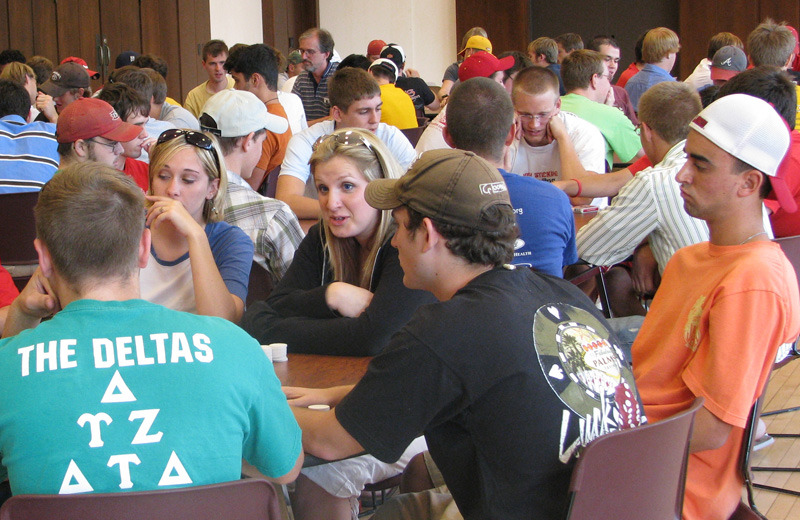
Texas Hold 'em is one of more than 40 intramural sports and activities open to faculty and staff with recreation memberships. Contributed photo.
Think your days of organized sports and activities are firmly stuck in the past -- along with the boom box and rotary-dial phone? Here's some good news. Faculty and staff who purchase recreation passes may participate, along with ISU students, in more than 40 intramural sports.
Badminton to bowling
Register for intramurals
If you're interested in participating in rec services' intramurals program, register online.
Administered by recreation services, the variety of intramural sports and activities at Iowa State is vast. Traditional team sports, such as basketball, volleyball, ice hockey and soccer, are part of the mix. Other options include curling, broomball, dodgeball, bag toss, adventure races, or euchre, hearts and Texas Hold 'em card tournaments. Competition is open to male, female, co-ed or open (any gender combination) teams. You can sign up with a team or individually, as a free agent.
Most events take place in the evenings and on weekends. The time commitment is up to you. Employees who choose to play intramural basketball, for example, will compete a couple evenings a week for a few months. But a card tournament is usually wrapped up in an afternoon, and a free-throw shooting competition could be over in minutes.
No experience required
If you're worried that your athletic skills are a bit rusty, individuals and teams are paired up according to their skill levels.
"There is no experience required to participate in intramurals," said Jenny Pollard, marketing and promotions coordinator for recreation services. "We pair people with like skills, and really, intramurals are about trying something new for the first time."
Feeling uneasy about playing sports with college students? Don’t, says Michael Davis, assistant director of student assistance and outreach in the dean of students office. He has participated in several ISU intramural sports and finds it a great way to have fun while staying fit.
"For the students, [intramurals] are a great way to see their faculty and staff members outside our offices and classrooms and make connections beyond work," Davis said. "For you, it's fun and a great way to stay active."
Fun, but not free
Recreation fees are $403 for an annual pass, $161 for a semester pass and $81 for a summer membership. Employees with monthly or weekly passes are not eligible to participate in intramurals. Additional fees apply for intramural ice sports to help pay for time at the Ames/ISU Ice Arena. Pricing information is available online.
Employee spouses and dependents (at least 18 years old), retired employees and spouses, approved affiliate employees and alumni association members also may participate in intramurals if they have a rec membership.
University employees also may be able to join one of the 50 student-organized sports clubs, but that is up to the clubs' student leaders. There may be additional fees required to participate.
Iowa State reaches accreditation milestone
With a recent reaccreditation, Iowa State notched 100 years of continuous accreditation. The university's accreditation was continued by the Higher Learning Commission (HLC) with no further comments, suggestions or conditions, President Steven Leath said during the Feb. 25 Iowa Board of Regents meeting.
Iowa State's next HLC visit is scheduled for 2025-26.
The reaccreditation required university-wide effort, Leath said. He directed special thanks to the members of the university steering committee for pulling together a tremendous amount of material, preparing documentation and coordinating the November 2015 campus visit. The steering committee was led by Dave Holger, associate provost for academic programs and dean of the Graduate College, and Karen Zunkel, director for undergraduate programs and academic quality.
The Higher Learning Commission accredits degree-granting, post-secondary educational institutions in 19 north central states.
Related stories:
Public comments sought in advance of accreditation review, April 9, 2015
Open forums scheduled in advance of accreditation visit, Sept. 24, 2015
ISCORE returns with new name
ISCORE celebrates its 17th year with a new namesake. The Thomas L. Hill ISCORE: Iowa State Conference on Race and Ethnicity, named for Iowa State's former senior vice president for student affairs and founder of the event, kicks off with a professional development afternoon for ISU employees on March 3, and a full slate of speakers and discussions for the entire university community on March 4. Registration is free and walk-ins are welcome; all events are held in the Memorial Union.
The preconference activities are open to all ISU faculty and staff, including a 12:30 p.m. workshop with diversity, equity and social justice consultant Heather Hackman and five breakout sessions led by Iowa State staff.
Friday's conference schedule includes a keynote lecture by Barbara Love, professor emeritus at the University of Massachusetts, Amherst. Love specializes in multicultural organizational development, serving as a consultant to colleges and universities throughout the country and overseas.
Professional development preconference
Thursday, March 3
11:30 a.m., Registration opens
Noon, Welcome and introductions, Sun Room
12:30 p.m., Workshop, Heather Hackman, Hackman Consulting Group, Sun Room
4:10 p.m., Breakout sessions
- "Difficult Discussions in the Classroom," Sun Room
- "Fears of Difference and Understanding the Benefits of Diversity," Campanile Room
- "Multicultural Competencies: Developing Awareness, Knowledge and Skills in Student Affairs Professionals toward an Inclusive Campus Climate," Pioneer Room
- "Building a More Inclusive Department: A Case Study," Gold Room
- "Diversifying STEM: Graduate Selection and Training for All Students," Cardinal Room
ISCORE schedule of events
Friday, March 4
8 a.m., Registration and continental breakfast, west lobby
9 a.m., Welcome, President Steven Leath, and opening address, Design dean Luis Rico-Gutierrez, Sun Room
10 a.m., Breakout sessions
- "Reversing the Media: #LatinxAreNot," Campanile Room
- "Creating and Publicizing a Diversity Plan," Cardinal Room
- "Creating Inclusive Curriculum and Pedagogy to Facilitate Inclusive and Diverse Classroom Environments," Gallery Room
- "Whose 'Side' Are You On? Why We Need Solidarity from Asian American/Pacific Islanders in the Fight for Racial Justice," Gold Room
- "Stories and Strategies: Listening to Students' Voices," Oak Room
- "Small Hurts to Substantial Pain: Understanding Microaggressions," Pioneer Room
- "Why Does Talking about Race Suck So Much? Helping Students Understand Systemic Racism and White Privilege," Room 3512
11 a.m., Breakout sessions
- "Black Lives Through the Lens, a Discussion on How the Media Portrays African Americans," Campanile Room
- "Creating Inclusive Classrooms: From Good Intentions to Research-Based Best Practices," Cardinal Room
- "The Womyn Behind the Counselor: A Panel Discussion of Transitions to a Predominantly White Institution," Gallery Room
- "Beyond Our Screens: Yik Yak and Racism," Oak Room
- "Fears of Difference and Understanding the Benefits of Diversity," Pioneer Room
- "Using Inclusive Language in Leadership," Room 3512
- "-ISMs explored through the eyes of George Washington Carver Scholars," Great Hall
Noon, Lunch and keynote address, Barbara Love, University of Massachusetts, Amherst, Sun Room
2:10 p.m., Breakout sessions
- "The Educational Experience of Native Americans at Iowa State: Past, Present and Looking Into the Future," Campanile Room
- "CyclONE Nation -> Aggie Pride: Lessons Learned During My Staff Exchange to North Carolina A&T," Cardinal Room
- "Real Talk: Discussing the Experiences of Minority Student-Athletes at Iowa State University," Gallery Room
- "Unconscious Bias: Self vs. Others' Need for Conscious Introspection," Gold Room
- "Exploring Identity through Film: A Day in the Life of an MVP Scholar," Oak Room
- "Understanding and Reducing Implicit Bias," Great Hall
- "-ISMs explored through the eyes of George Washington Carver Scholars," Great Hall
3:10 p.m., Breakout sessions
- "Unraveling Sexual Stereotypes of Asian American Men and Women," Campanile Room
- "Anyone know where I can cash in my white privilege points? Do I need a card? I keep hearing I have this, but I'm not sure where to go or how to use it," Cardinal Room
- "Inclusive and Uncommon Leadership: Subverting a Perfectly Acceptable Student Ambassador Program," Gallery Room
- "Microagressions, Revisited: Recognizing and Addressing Systems While Maintaining Relationships," Gold Room
- "Men of Color: Intersections of Race/Ethnicity, Gender Role Socialization and Masculinity," Oak Room
- "The Missing Color on the Rainbow Flag," Room 3512
4 p.m., Reception, Sun Room
Dynamic trio
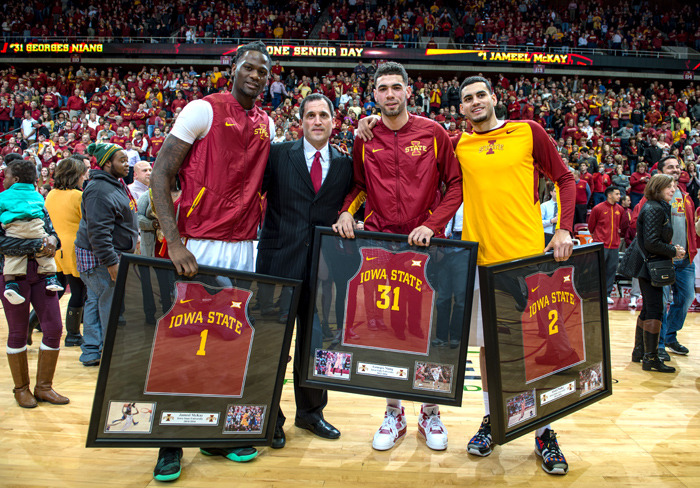
Head men's basketball coach Steve Prohm stands at center court in Hilton Coliseum with the three seniors on his squad (from left, Jameel McKay, Georges Niang and Abdel Nader) during a pregame ceremony on Senior Day, Feb. 29. Prohm called the trio the "winningest senior class in the history of the university." Following a trip to Lawrence, Kansas, March 5 to close out the regular season, Prohm's team will prepare to defend its 2015 Big 12 Conference Championship title in Kansas City March 9-12.
A week ahead of the men, the Cyclone women's basketball squad competes in its conference tournament March 4-6 in Oklahoma City. Coach Bill Fennelly's team opens against Texas Tech at 6 p.m. Friday. Photo courtesy of athletics communications.
